Aug 24, 2024 Bad Ragaz, Switzerland, Day 2 of Psychology Symposium
Hello. Today is the second day of the psychology symposium in Switzerland on the theme “Tracing the Traces of Guilt” (Der Schuld auf der Spur).
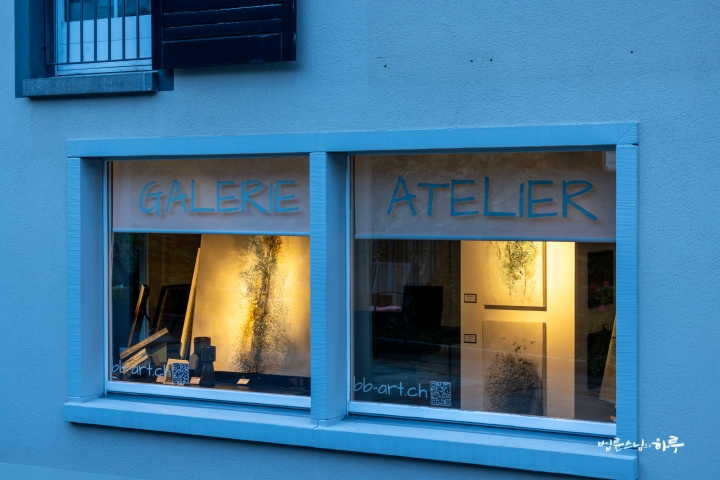
Sunim took a short nap and woke up at 1 AM to prepare for the online Jungto Society joint meeting. At 2 AM local time, 9 AM Korean time, the Jungto Society joint meeting began.
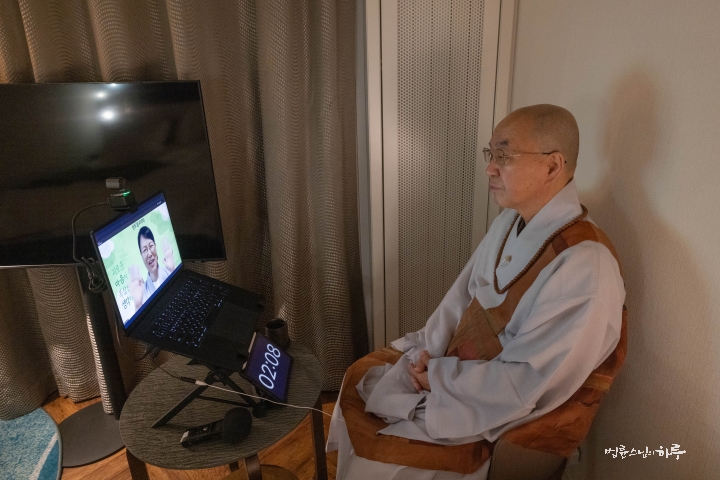
The Jungto Society joint meeting is where all executives from organizations under Jungto Society, including the Lay Member Group, lay Sangha, and Social Activities Committee, gather to share and discuss each unit’s projects. Participants thoroughly reviewed the materials in advance before attending today’s meeting.
Before starting the meeting, Sunim gave an opening Dharma talk. Sunim emphasized that now is the time for a new breakthrough, reflecting on the past year and a half since starting the 2nd 10,000-Day Practice.
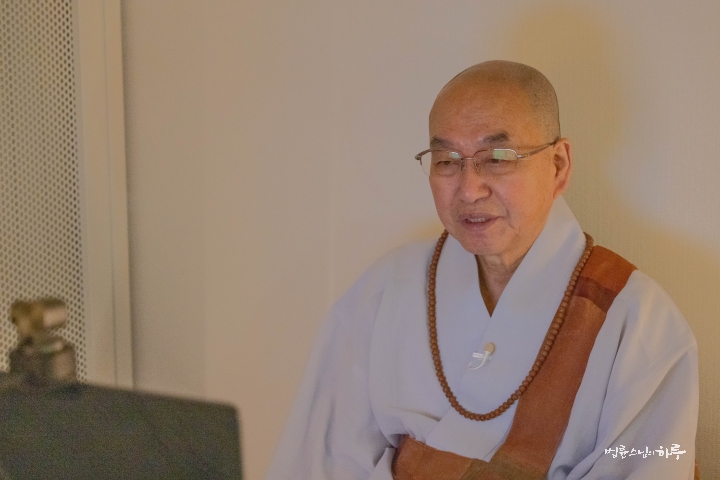
“I am now in Bad Ragaz, a spa town in Switzerland. This is a small rural village that is a resort. An international psychology symposium is being held here, and I have been attending the symposium since yesterday. It’s 2 AM local time now. I’m glad to meet you all online even from this far away. While the online environment has some shortcomings, it also has good aspects like this.
How Will We Evaluate the Present When Looking Back 30 Years from Now?
When Jungto Society started the 2nd 10,000-Day Practice, we didn’t have enough time to discuss how the world would change over the next 30 years and what Jungto Society should focus on accordingly. On the positive side, we could say that since we set the right direction when starting the 1st 10,000-Day Practice, we just need to expand that direction in the 2nd 10,000-Day Practice. In other words, we can expand what was mainly aimed at Koreans to the whole world. However, since there will be many changes in the future world, we can say that we are not sufficiently prepared to evaluate that “we set the right direction back then” when looking back 30 years from now. Therefore, the 1st 1000-Day Practice during the 2nd 10,000-Day Practice is a period when we need to make more preparations. Although we have already stabilized the online system to some extent because we transitioned to an online Jungto Society during the final period of the 1st 10,000-Day Practice due to the COVID-19 pandemic, we need to make more preparations in terms of both human and material resources to expand based on this.
Now, halfway through the 1st 1000-Day Practice of the 2nd 10,000-Day Practice, if we re-evaluate our activities based on the goals we initially set, we seem to be almost stagnant to the point where it looks difficult to achieve the goals. Of course, from the perspective that other organizations in the world are experiencing the same difficulties, we could evaluate that we are doing well even now. However, since Jungto Society has been working to actively respond to the changing world since its founding, it is not an appropriate evaluation to say that Jungto Society is also stagnating because other organizations are generally struggling. It can be seen as a trend in society that the activities of religious organizations or civic groups that maintain existing methods are gradually shrinking. However, Jungto Society is an organization that started anew to overcome such trends. Nevertheless, if Jungto Society is currently unable to break free from these limitations, I think it’s time to find a new breakthrough.
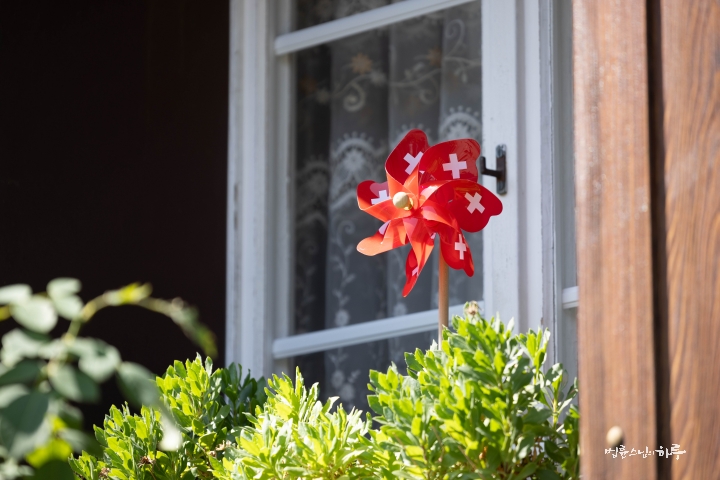
Why We Need a New Breakthrough Now
In that sense, while the introduction of online methods helps spread Jungto Society, it seems to have limitations in training personnel and expanding volunteers. The number of people who just listen to Jungto Buddhism courses or online Dharma talks and like them is increasing, but the online method seems to have limitations in training people to become Jungto Society members who directly practice meditation, giving, and volunteering.
There are two ways to solve this problem. First, we need to reinforce offline methods. Practice is an important process of meeting people, feeling their scent, directly seeing with eyes, hearing with ears, and experiencing with the body to learn. However, with online methods, everything disappears the moment you turn off the monitor switch, so it’s difficult to create people who actually practice.
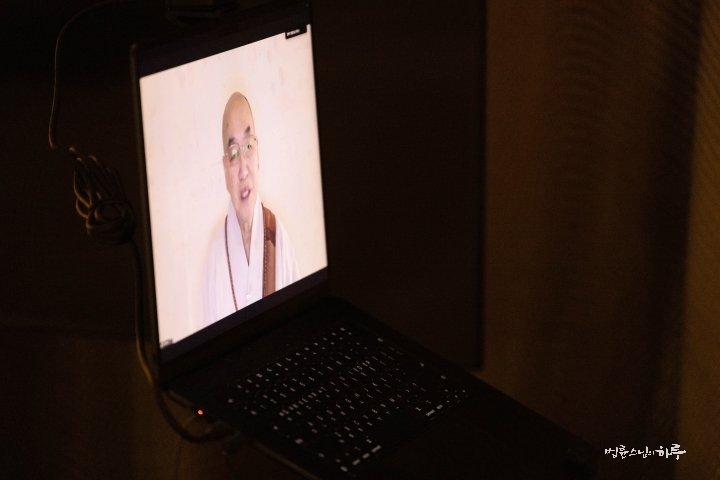
In that sense, we need to consider ways to actively utilize the Jungto Social and Cultural Center. In fact, the Jungto Social and Cultural Center should be properly operated to become the size of one Jungto Society headquarters branch. The personnel trained here should manage the building and provide the manpower needed by various social activity organizations. However, due to the COVID-19 pandemic, as we transitioned to an online Jungto Society, the Jungto Social and Cultural Center has not been properly utilized. So I would like to consider ways to effectively utilize the Jungto Social and Cultural Center according to its original purpose as one method to break through the current stagnant situation.
Currently, all meetings and educational programs of Jungto Society have changed to online. However, there hasn’t been enough review of whether meetings and education are actually being implemented in a way suitable for online methods. We have moved programs that were conducted offline directly online, but we lacked in redesigning them to suit the characteristics of online. The leadership initially lacked knowledge about online and didn’t have time. Although we did a lot of research, there were hardly any cases of other religious organizations or civic groups changing offline programs to suit online methods and operating them, so it was difficult to benchmark. We could have looked for similar cases in general companies, but due to lack of capacity, sufficient investigation was not carried out.
I think that for online Jungto Society to truly be activated, it needs to change completely to educational methods, organizational operation methods, and practice methods suitable for online, beyond simply moving offline activities online. So making online Jungto Society more suitable for online methods is necessary for the future, but we can’t readily push it now. This is because we, the driving force, don’t know much about online methods.
So I think it would be good to start by supplementing the shortcomings of online methods with offline activities. However, while this helps maintain the current state, in the long run, it could result in setting back online Jungto Society. Some parts may go back offline again. Also, even now, activists are doing many new things after transitioning to online Jungto Society, and if we add reinforcing offline activities to this, I’m concerned that the workload might become too heavy. Considering all these aspects, rather than changing everything immediately, I think we should choose a method of forming a task force to reinforce offline methods and experimentally applying only parts.
Preparation for Expanding Worldwide
Even now, your daily lives are full of work, and because your daily lives are so busy, you’re not properly planning and designing the future of Jungto Society. I’ve stepped back a bit from the front lines and am exploring the foundation for expanding spreading the Dharma to the world and JTS projects. As I looked for new breakthroughs in JTS projects, I realized that spreading the Dharma to the world no longer needs to be limited to developed countries like the United States, UK, and Europe, but can unfold in all countries of the world. This is because translation and interpretation, which were the biggest obstacles to spreading the Dharma to the world, are approaching an era where there are no difficulties thanks to the rapid development of artificial intelligence technology. We need more discussion on how to revitalize spreading the Dharma to the world by utilizing these changes in the world well.
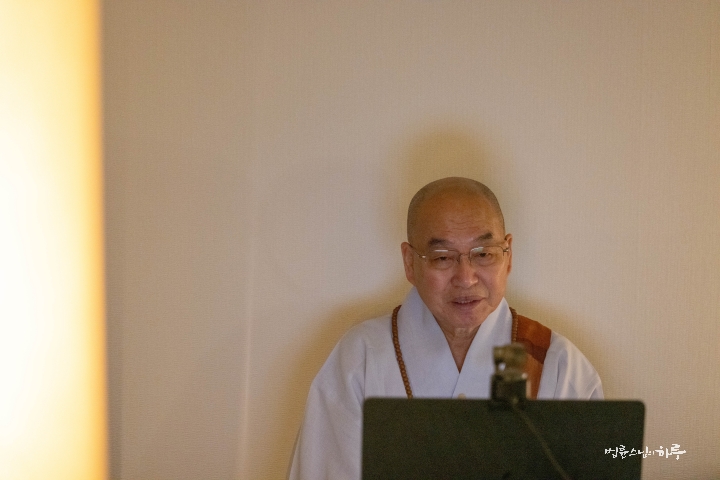
Also, in preparation for foreigners coming to Korean Jungto Society as spreading the Dharma to the world expands, we need to establish an education and training system for foreigners. In the end, for spreading the Dharma to the world to gain strength, Korean Jungto Society needs to settle more in both online and offline aspects, and efforts should be made to develop systems for foreigners.
You all worked very hard during the first half of the year operating Jungto Buddhism courses, Jungto Sutra courses, and Happiness School. Especially, we all put our full effort into preparing for the June 13th Ten Thousand People’s Dharma Assembly. Looking back on the history of Jungto Society, activities where Jungto Society put all its efforts, such as helping North Korean compatriots and the Empty Bowl Movement, were very overwhelming and difficult at the time. But looking back, such activities became factors for Jungto Society to develop dramatically. This June 13th Ten Thousand People’s Dharma Assembly was also a big task and difficult for us at the time. But as time passes, we may evaluate that Jungto Society was able to expand dramatically from the June 13th Ten Thousand People’s Dharma Assembly. To make that happen, we need to continue the activities we are doing, not just do them once and stop.
All work in Jungto Society is done by the power of volunteers. Among the volunteers, you who participated in today’s joint meeting can be said to be the core members of Jungto Society. Jungto Society has been maintained by you, and will continue to develop in the future. This is not something someone else tells us to do. Whatever decision we make in today’s meeting, it’s all work we have to do, and the donations we make become the financial resources to do that work. So in today’s meeting, I hope you will evaluate Jungto Society’s past projects and design the future with the perspective of ‘What role will Jungto Society play in the changing world flow, and what meaning will that activity have in individual lives?'”
Next, the representative of Jungto Society declared the opening and presented the business report for the first half of 2024. Then, there were consecutive business reports and Q&A sessions for the Secretariat, Special Youth Division, International Special Division, and Happiness Movement Headquarters. Various questions, suggestions, and proposals poured in.
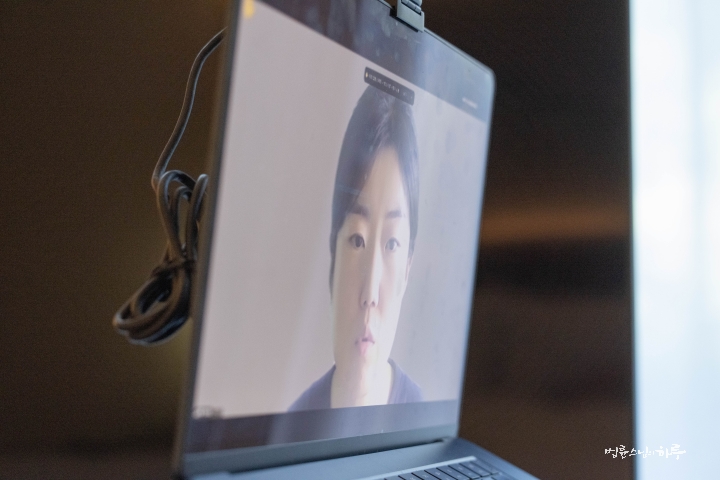
Next, there were special reports on the activist support system, the happiness platform, and the June 13th Ten Thousand People’s Dharma Assembly, along with presentations on special practice plans for practice, spreading the Dharma, and implementation, gathering opinions from participants.
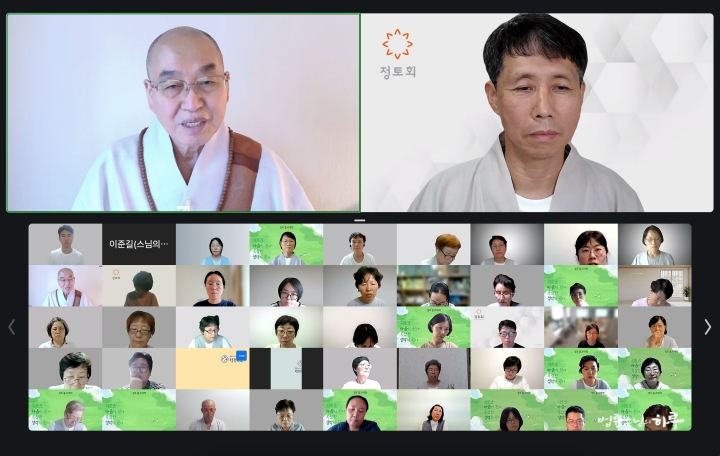
Then, there was a 70-minute discussion time for branch-specific agendas. Meanwhile, the day gradually dawned. While the branch-specific agenda discussions were in progress, Sunim had breakfast at the dining room in the accommodation from 7 AM.
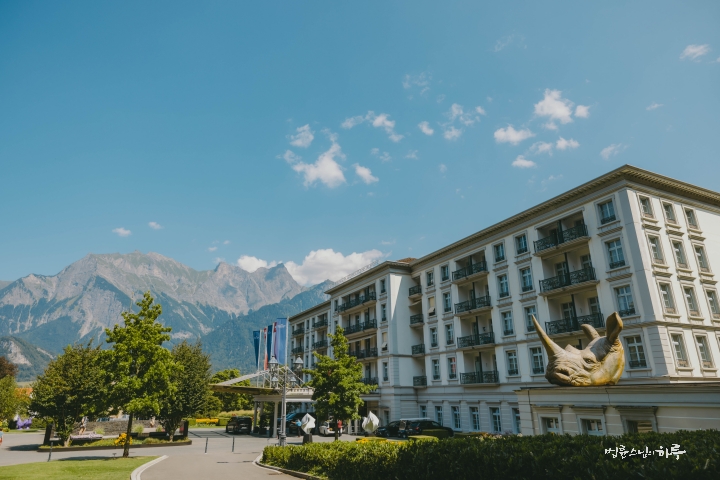
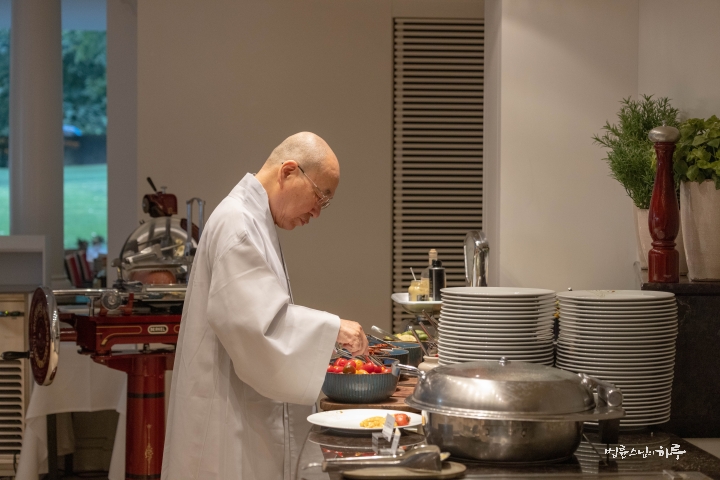
After finishing a simple breakfast, Sunim read the written results of the discussions by the joint meeting participants.
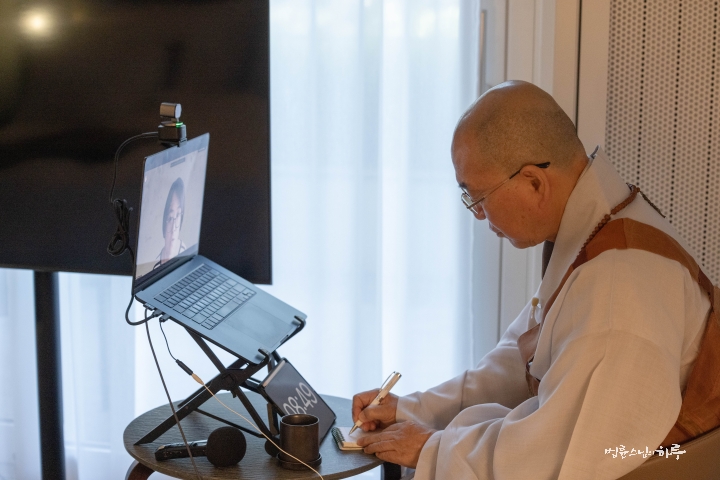
At 3:10 PM Korean time, 8:10 AM local time in Switzerland, Sunim participated in the joint meeting online again. First, he encouraged the activists who had focused on the meeting all day.
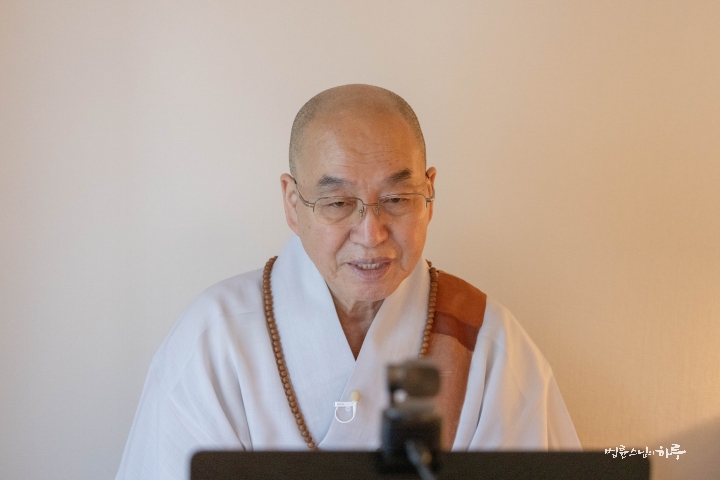
“You’ve received reports and had active discussions all day from this morning until the afternoon. Especially at the end, you discussed various methods for the development of Jungto Society by branch. This time will be a time to talk about the problems that emerged during your discussion process.”
Participants asked Sunim various questions that arose during the discussion process. Not only questions but also various suggestions for the operation of Jungto Society poured in. In particular, many ideas came up about how Jungto Society members can experience more practice.
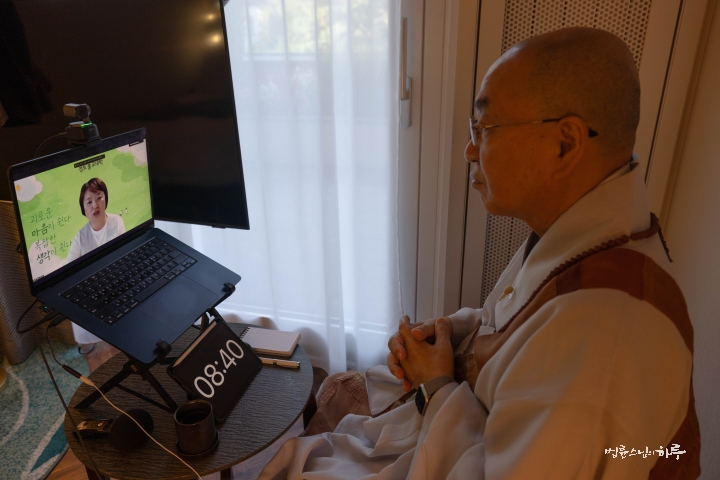
“There are continuing opinions that people who joined Jungto Society after graduating from Jungto Sutra courses find it difficult to settle into practice Dharma assemblies. So I want to make a suggestion about how to conduct practice Dharma assemblies. There’s a response from participants that it feels a bit empty when we only share impressions after the practice Dharma assembly. Last time, when we set a peace action that I could practice for a week and shared the experience after the Dharma assembly, the atmosphere was much better. Like that, I think it would be good to set individual practice tasks, practice for a week, and then have time to share those experiences after the practice Dharma assembly. I’m worried that just sharing about daily life might drag on too long. If we set one practice task with our Dharma friends and share, I think that can also become sharing about daily life.”
“I agree that Jungto Society is in a period of stagnation, and I think the cause might be that the aspects of dedication and practice have been greatly weakened. The reason volunteers stop their activities is because they feel constantly drained. If they could experience the unity of work and practice within their duties, they would be able to continue their activities, but I think that’s not happening now. Above all, I think it would be good to reinforce the curriculum in a direction that can strengthen the experience of practice a little more while attending Jungto Buddhism courses and Jungto Sutra courses. I think that would be much more helpful for self-practice after graduation.”
As various suggestions continued, Sunim gave a word about this.
How Should We Revise the Practice Dharma Assemblies?
“There are many suggestions to revise the practice Dharma assemblies, but how should we revise them? For example, if we increase the Dharma assembly time, people complain that it’s too long, and if we reduce the Dharma assembly time, they raise issues that there’s not much to listen to. So a lot of research needs to be done on how to conduct Dharma assemblies effectively while keeping them short. The method of conducting the 49-day memorial service also needs to be created in a way that preserves tradition while meeting the needs of modern people, so that anyone would say it’s innovative. For practice Dharma assemblies as well, we need to research which parts should be adjusted from the basic framework we’ve been using so far.
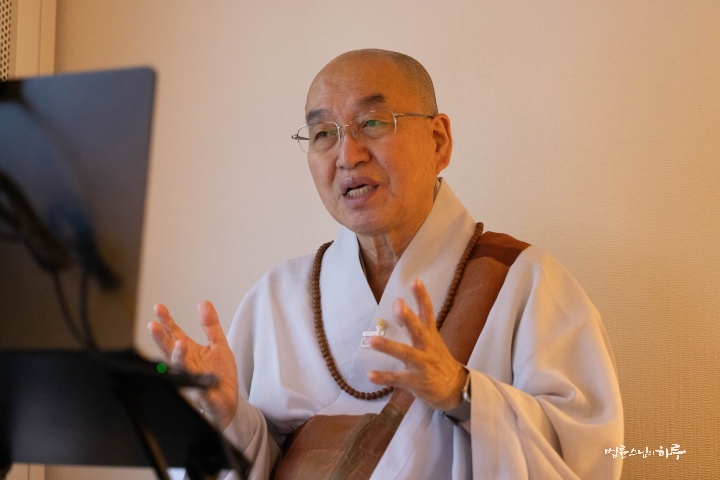
When simplifying Buddhist ceremonies to meet public demands, it may lead to expansion but not convergence. We need to consider whether following only what people like can achieve the goals of Jungto Society. On the other hand, what happens if we ignore public demands? For example, to participate in the 100-Day Chulga program, one must complete 10,000 prostrations, graduate from Jungto Buddhism Course, and complete the Enlightenment Retreat. These high barriers result in fewer participants. What if we lower these barriers? It’s uncertain whether lowering them will increase participation, and even if it does, will participants experience the same life changes as those who overcame the original barriers?
As we discuss these issues, concerns often halt the conversation. When new problems are raised, discussions are again suspended due to various worries. A new suggestion has emerged to alternate between maintaining traditions and adapting to current realities, while jointly examining how many people gather and what occurs during the process.
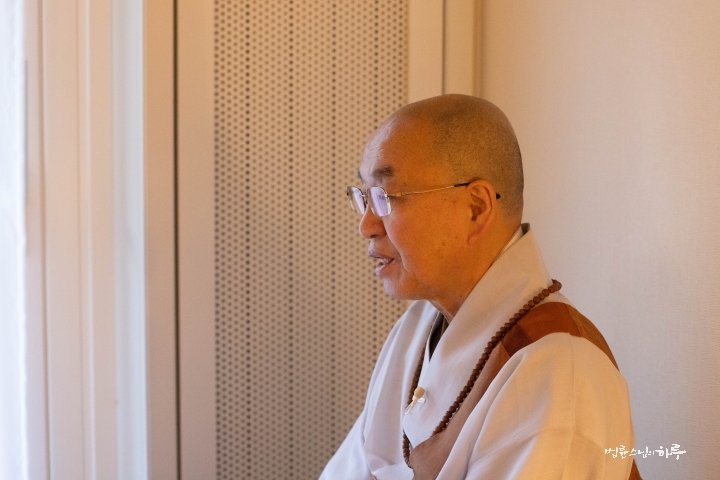
Similarly, I hope we can conduct more research on how to operate practice Dharma meetings. Currently, we devote much less attention to practice Dharma meetings compared to the Jungto Buddhism Course and Jungto Sutra Course. We need to care for members attending practice Dharma meetings as much as we do for Jungto Buddhism Course students. However, it seems that branch leaders and group facilitators currently focus more on recruiting and managing new students for the Jungto Buddhism Course. I also think we need to further stabilize the education for members who have become engaged volunteers.
At 9:30 AM, Sunim had to attend the symposium, so he only took questions and left the joint meeting.

After finishing the broadcast, Sunim immediately went down to the symposium venue. The morning symposium began with a presentation by Anna-Céline Sommerfeld, an anthropologist and activist working in Berlin, Germany. She presented a new perspective on our economic relationships under the theme “Guilt as a Relationship.”
Can We Replace Our Debt Relationships With Other Types of Relationships?
“Most of our common economic relationships are based on ‘debt relationships.’ A ‘debt relationship’ refers to relationships where we borrow or lend money, creating a system of owing and being owed. For example, people try to monetize even nature. We need to move beyond these debt relationships. Instead, we should adopt caring relationships where we help and depend on each other as a new standard.”
She gave examples of projects in Laos and India. Participants in these projects operate farms together and share the profits. Through this, they were able to confirm that it’s possible to move beyond debt relationships and establish caring relationships where people help and take responsibility for each other.
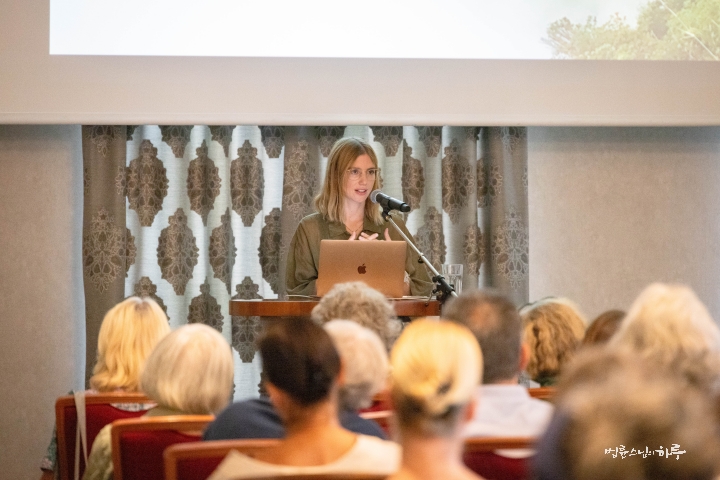
The Q&A session with the audience after the presentation was also interesting. One audience member shared a story about a choir formed by Palestinian and Israeli youth that has been active for 12 years, caring for each other, as an example of how mutually supportive relationships are possible. In response, Sommerfeld said, “Recognizing and accommodating the other’s wounds and needs is only possible in caring relationships.”
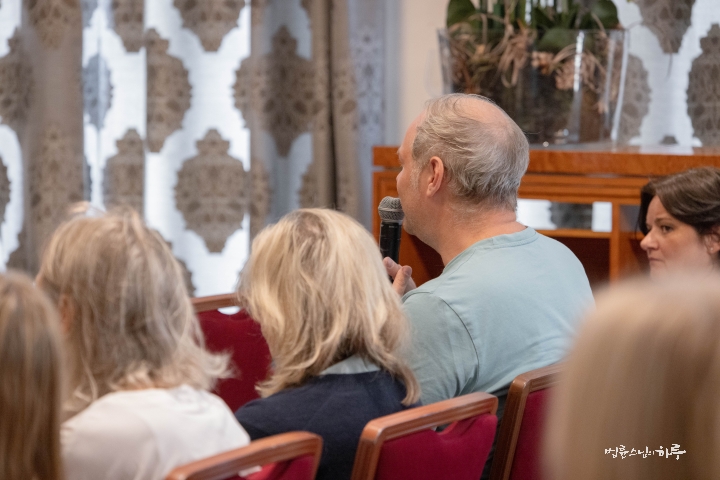
Another audience member asked how to address power imbalances. Sommerfeld used the example of a communal farming project in India, saying, “A farm where everyone works together, owns collectively, and operates without individual ownership is a new approach we haven’t experienced before. This method operates through grassroots democracy, which can help reduce social inequalities.”
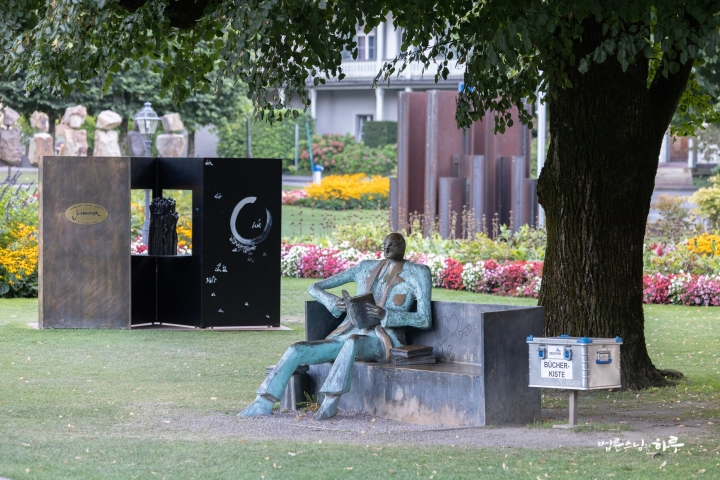
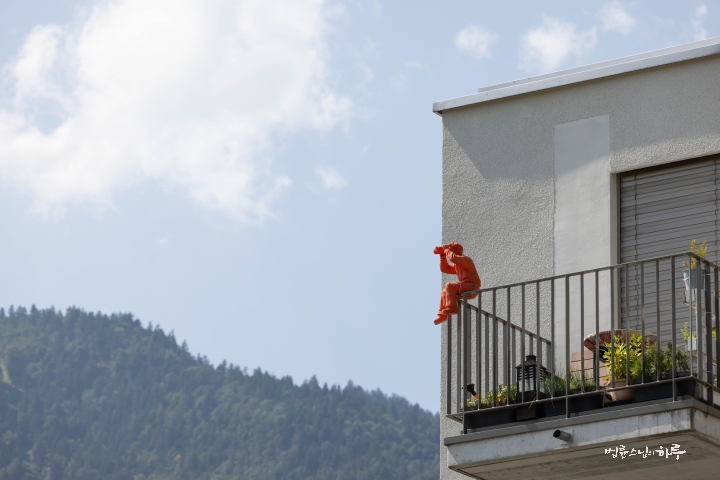
Another audience member suggested that the parent-child relationship could also be seen as a debt relationship. For example, parents expect their children to succeed and take care of them in their old age. Sommerfeld responded, “There are kindergartens and schools operated through discussions among parents, children, and teachers. Here, all members care for each other to meet everyone’s needs. This creates an environment where everyone can grow freely.” An elderly audience member stood up abruptly to share their opinion after hearing this exchange.
“Let me speak as a grandmother. The path that all parents and grandparents must take is to care for and protect children, but at some point, we must recognize that children are separate individuals and let them go.”
Finally, an audience member who introduced himself as a climate scientist pointed out problems with developed countries.
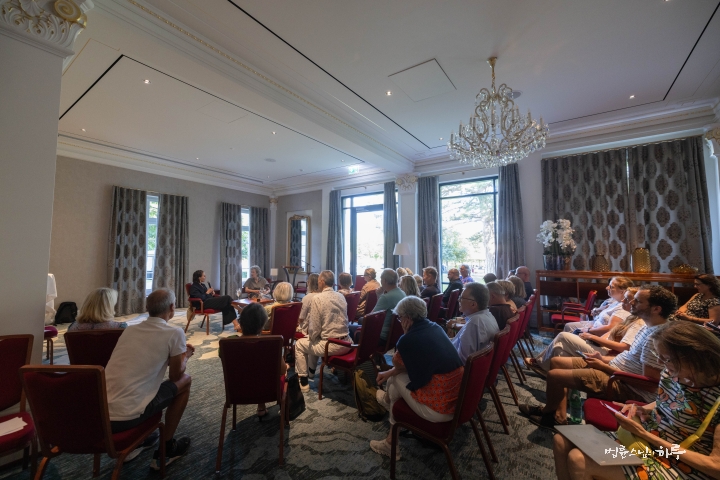
“I think the carbon emissions from 1 billion people in Western developed countries that have caused the climate crisis is like a debt owed to the 7 billion people in developing countries. If we were to convert this debt into money, it would be appropriate for all developed countries to give their entire year’s total production to developing countries. Developed countries are destroying nature and threatening the survival of 7 billion people. I hope that in your future lectures, you will sharply mention such power imbalances to shock people.”
Sommerfeld responded with a smile, saying that “such shocking statements haven’t been very effective so far,” and concluded her lecture. Sunim focused on the symposium, taking notes on the presentation content and the audience’s questions.
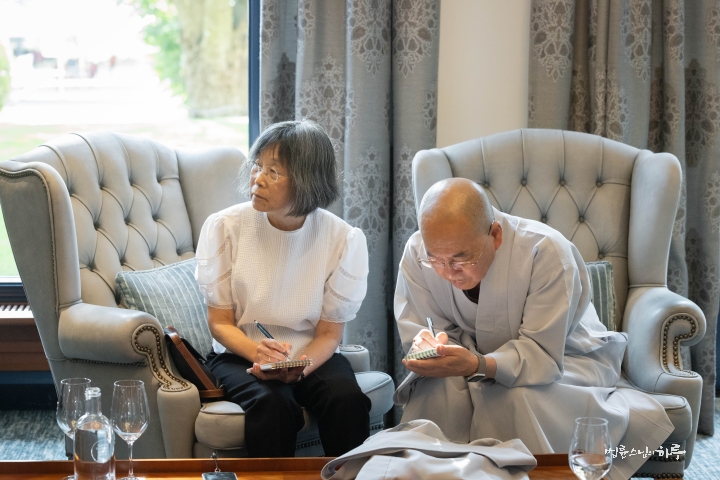
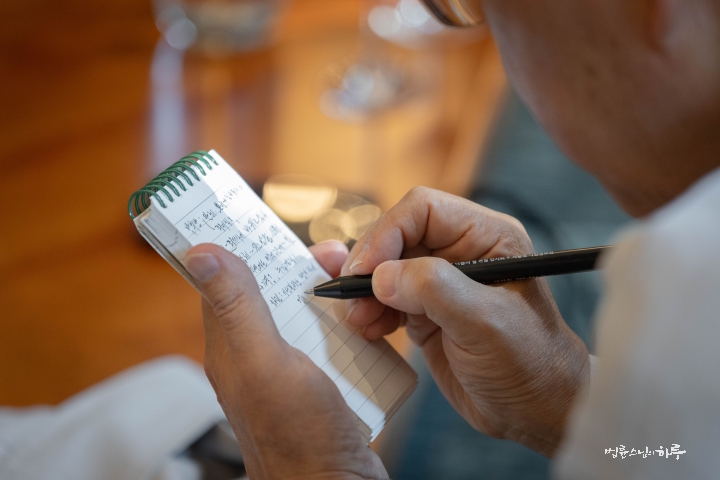
Next, Thomas Hunkeler, a professor of French and Comparative Literature at the University of Fribourg, gave a lecture on the theme of “Guilt and Shame.”
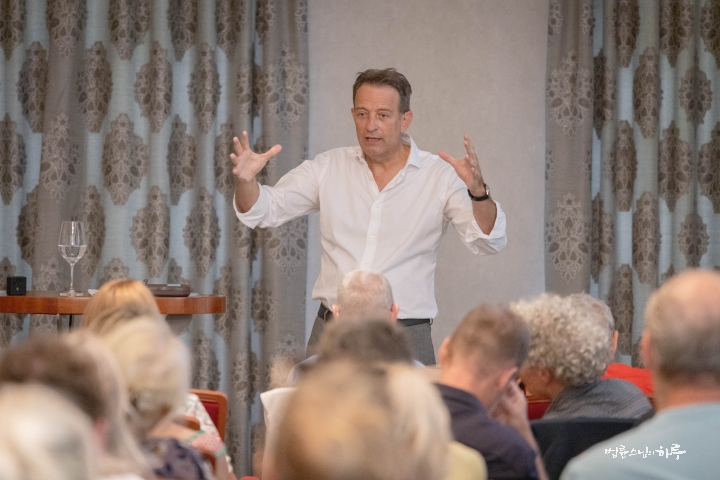
He talked about guilt and shame as portrayed in the literary works of Annie Ernaux, a French writer who won the Nobel Prize in Literature. Professor Hunkeler explained that Ernaux’s works reflect both her personal experiences and social issues.
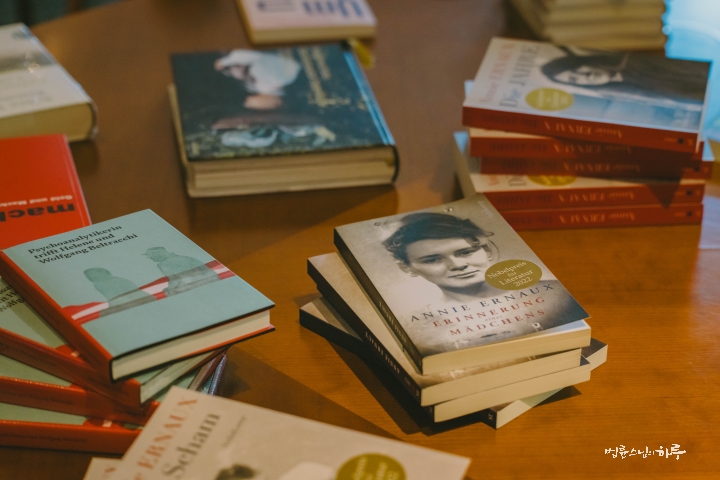
After the morning symposium, Sunim walked out of the accommodation with Hoo Nam Seelmann and had lunch at a nearby restaurant.
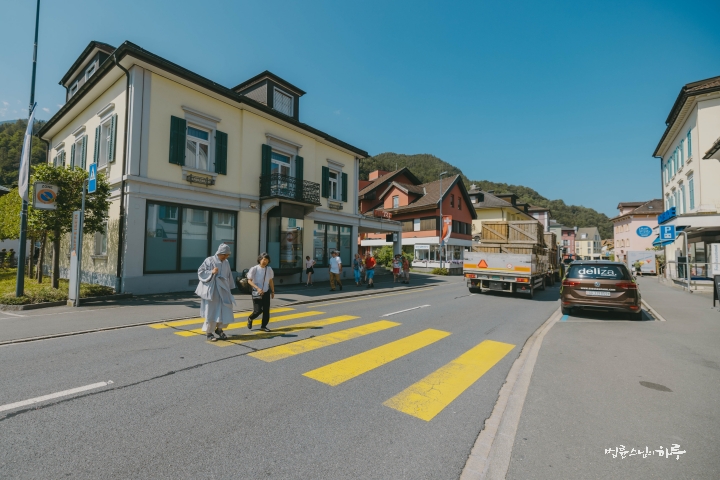
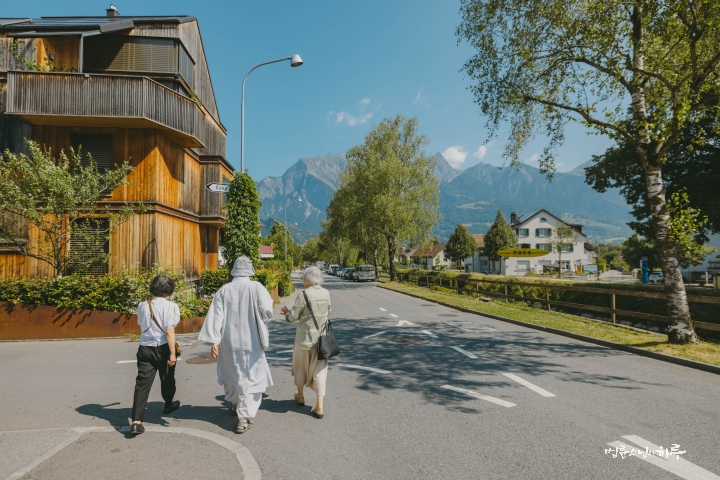
During lunch, Sunim and Hoo Nam Seelmann discussed the upcoming dialogue with Dr. Jeannette Fischer, a psychologist, scheduled for the next day. Hoo Nam introduced some key questions to Sunim and discussed the direction of the dialogue.
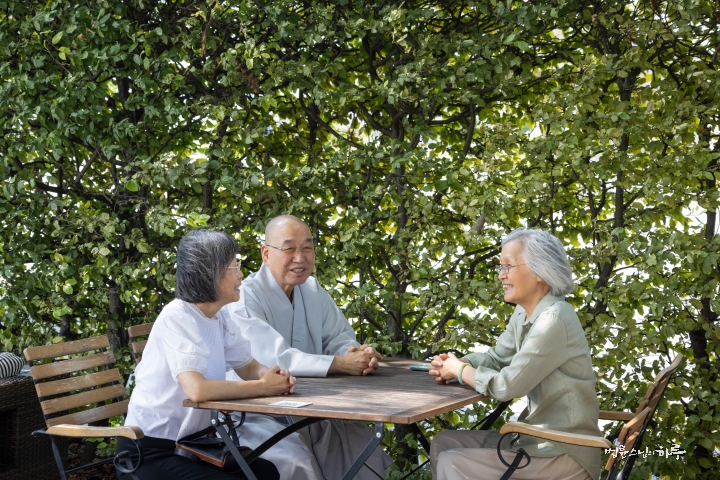
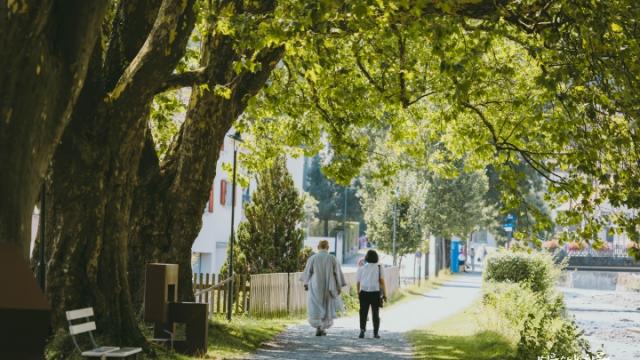
The symposium continued in the afternoon. Marc Chesney, a professor at the University of Zurich, presented on ‘Debt Issues and Social Responsibility in the Financial Sector.’
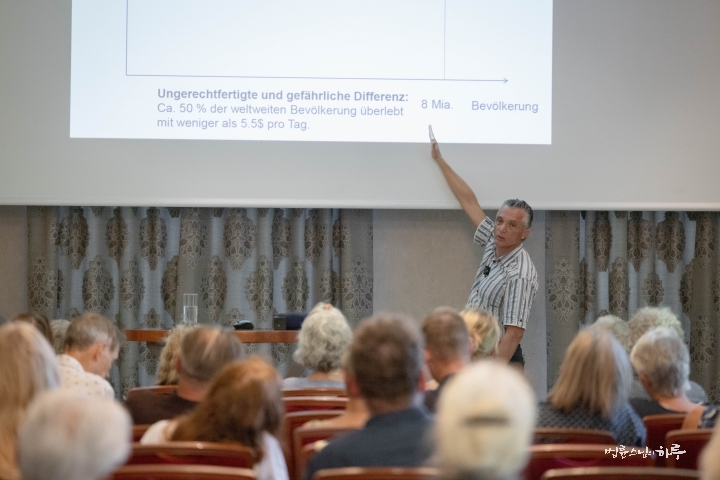
Professor Chesney compared the modern financial market to a ‘casino economy.’ This meant that the financial market relies too heavily on risk and speculation, much like a casino. He pointed out that this system, due to globalization, digitalization, and excessive financialization, leads to the concentration of wealth and profits in the hands of a very few.
Professor Chesney mentioned recent financial crises, explaining that these problems not only cause economic crises but also lead to social inequality. The issues in the financial system are not just about money, but deeply affect people’s lives and result in unfair outcomes across society. He emphasized that the financial system needs to be reformed to fulfill its social responsibilities beyond just pursuing profits. In particular, he argued for the need for policy changes to enhance transparency in financial markets and reduce excessive reliance on debt, stressing the urgency of fundamental reform in the financial system.
Next, Gerhard Johann Lischka, a publisher and curator, introduced how he has explored history and law from the perspective of guilt and atonement, and how he has unraveled the complex emotions of guilt and atonement through artistic expression.
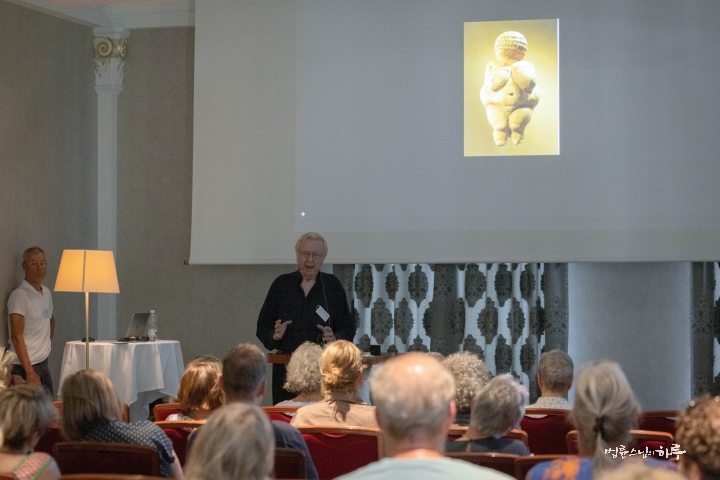
Finally, Hanna Lakomy, a sex worker and philosopher, had a dialogue with Athene Fischer on the theme of guilt that can emerge in sexual situations and its psychological and philosophical exploration. She also detailed how guilt affects the profession of sex work and what activities are carried out in sex worker unions and anti-human trafficking organizations.
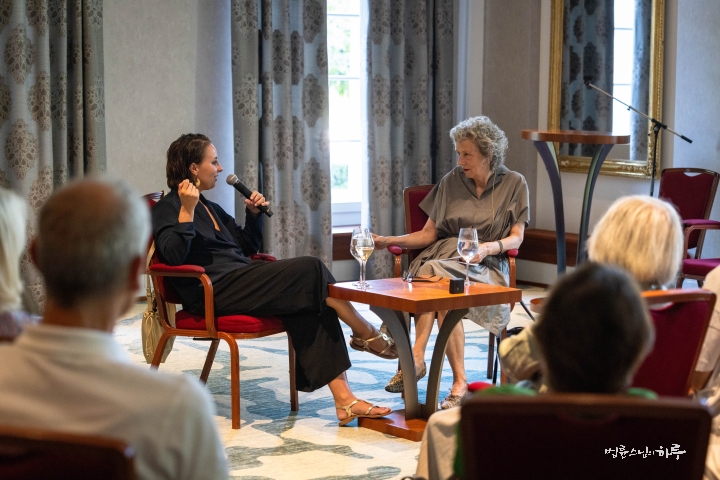
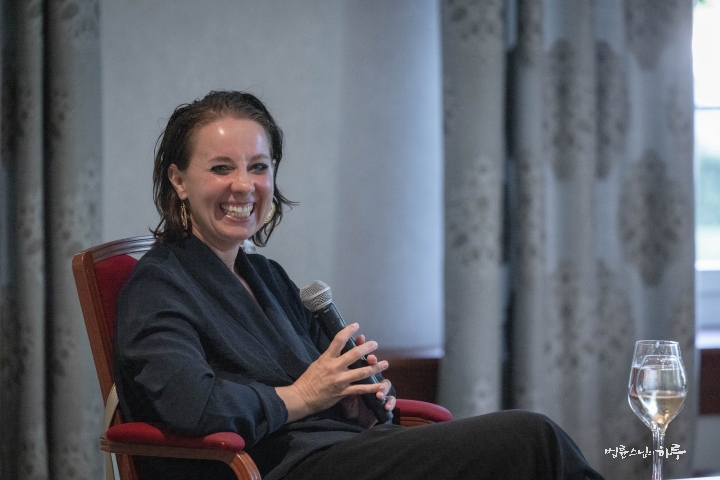
Today’s symposium allowed for reflection on various challenges and tasks facing modern society. In particular, the presentations on redefining economic relationships and financial systems, as well as exploring human experiences through literature and art, provided an opportunity for deep reflection on the structural problems of modern society.

After lunch, Sunim rested in his room for the entire afternoon. He was still recovering from the fatigue of traveling by plane all night yesterday, and today he had to stay up all night to attend the Jungto Society joint meeting due to the time difference with Korea. Also, afternoon in Switzerland was midnight in Korea. Sunim took sufficient rest to recover his health and prepared for tomorrow’s symposium dialogue.
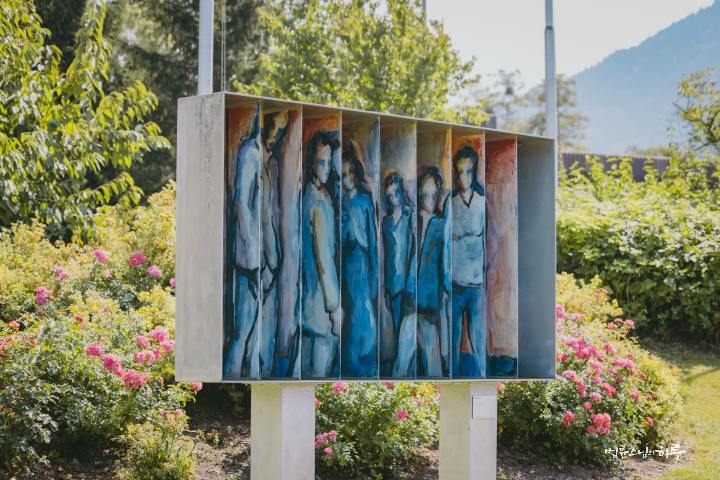
Tomorrow is the last day of the psychology symposium. The symposium will conclude with a dialogue between Sunim and psychologist Dr. Jeannette Fischer. After the symposium ends, Sunim will return to Zurich to give a lecture for the Korean community there.




